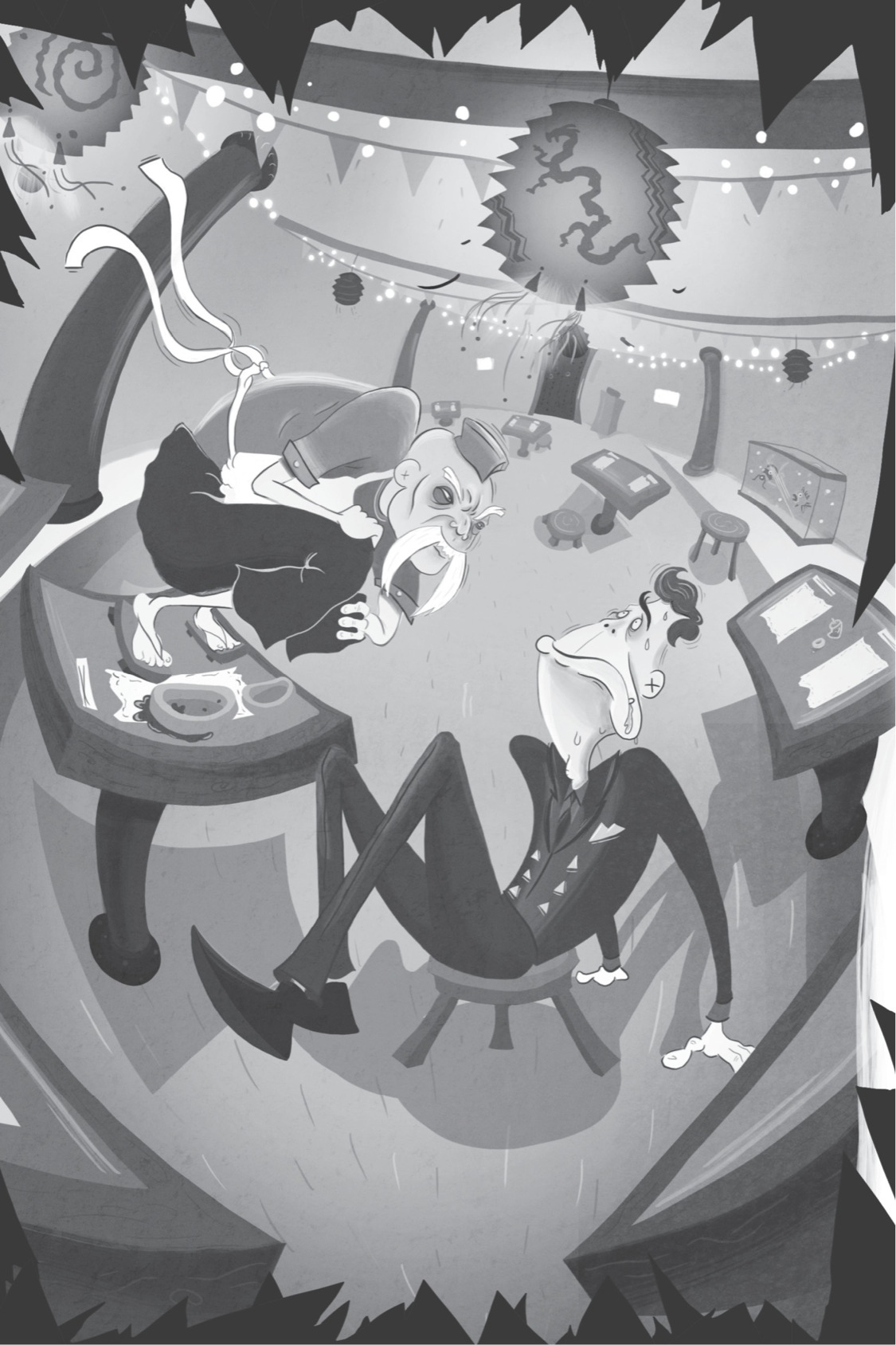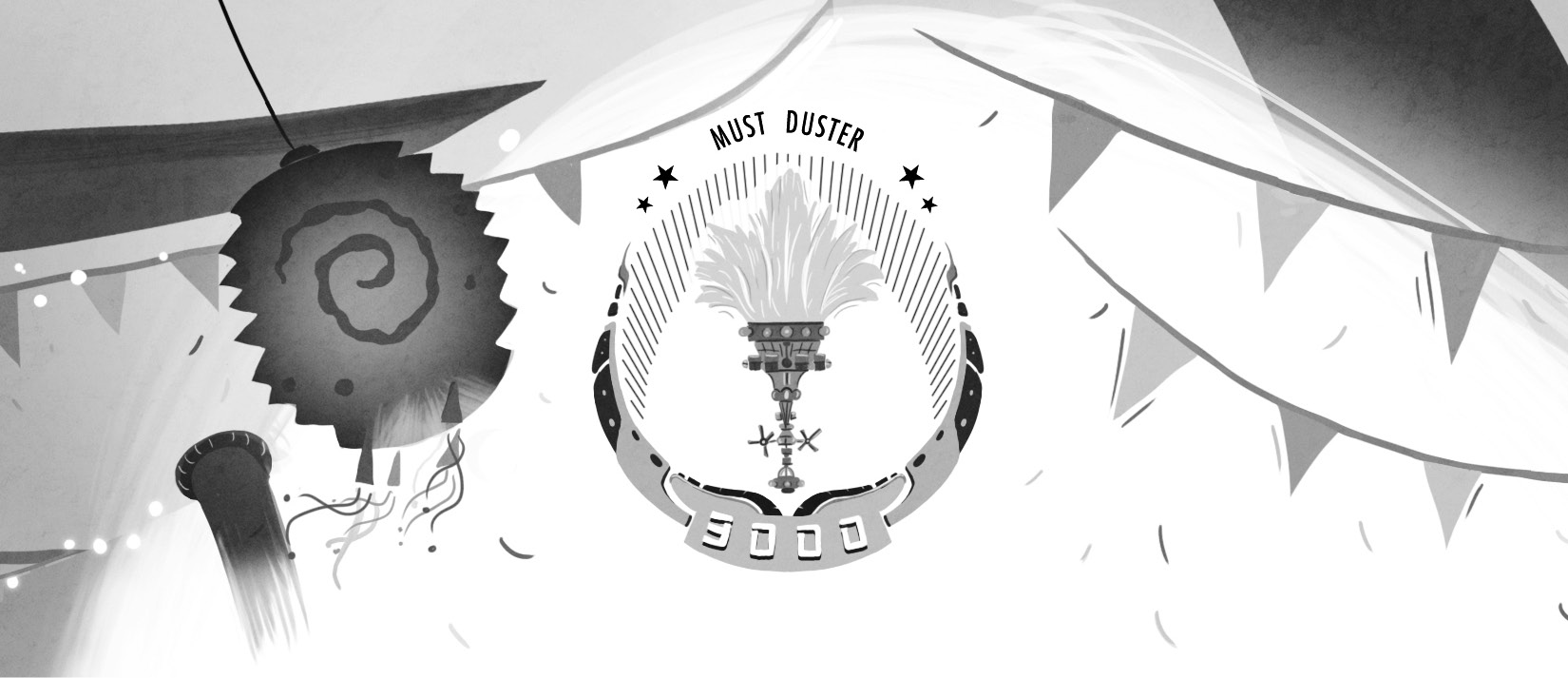

CHAPTER 17
In which Chuck Brickweather has nothing to do with the carpet
It was hard to believe the employees of the Research and Development Department could love such a shabby restaurant. To Chuck, it looked more like a bankrupt insurance company than somewhere you would go for a meal.
What a dump, he thought.
He checked the address on the flyer again. No, this was definitely the place. There was even a sign out front, with red arrows pointing potential customers up to the second floor.
Chuck climbed the steps and came to a curtain of dark green beads. He stooped through them and saw the waitress, an attractive, middle-aged woman whose attention was absorbed in a travel magazine. It took her a moment to notice Chuck was standing right in front of her.
“Oh, hi,” she said at last. “Are you here about the carpets?”
Chuck thought this was an odd way of greeting a customer. But on the other hand, glancing at the floor, he could see the faded carpet was in dire need of a shampoo.
“Sorry,” said Chuck, “I’m just here for lunch.”
The woman’s eyes popped wide. “Seriously?”
Again, Chuck was surprised by this unusual approach to customer service. “This is Famous Freddy’s Dim Sum Emporium. Isn’t it?”
“Yes, yes, of course!” The waitress searched the podium where she stood, apparently looking for a menu. When she found one, she led Chuck to the middle of the restaurant.
“Anywhere you like,” she said. “Your choices are pretty open.”
The woman wasn’t kidding: the restaurant was empty. Chuck chose a table near what he took to be the entrance to the kitchen.
“I’ve heard you do a lot of takeout.”
The waitress nodded. “It’s most of our business. We’ve got a whole trailer just to lug the stuff around town.”
“A trailer, you say? Those’re some big orders.”
“Huge!”
Chuck recalled seeing it: a great white box, towed through the DENKi-3000 compound by a rusty red Volkswagen. It looked to him like a whale—being towed by a monkfish.
“So . . . do you make the deliveries yourself?”
The woman blinked at him as if she didn’t understand the question. “Maybe you’d prefer the takeout menu.”
“No, no. I’m just curious.”
“Anything about deliveries, you’ll have to ask my father. He runs this place and does nearly all the cooking himself—although I’m starting to help out on the side, you know?”
Chuck nodded.
“Anyway, let me know when you’re ready to order.”
“I already am.”
“But you haven’t even opened the menu.” She pointed to it on the table, where it still lay shut.
“I saw the sign out front, and I’d like to sample the goods. Give me two orders of your famous pork dumplings.”
“Sure thing.” The waitress went to the nearby doors and poked her head inside. “Hey, Pop, wake up! We just got two orders of the special. To stay.”
She walked back to the front of the restaurant, giving Chuck’s table a wide berth (perhaps, Chuck thought, to avoid more of his questions).
Chuck looked around and tried to admire the decor, but it wasn’t easy. Wobbly, dilapidated furniture and garish colors were the order of the day.
What was it about this place that so attracted the mysterious R&D workers? From the kitchen, he heard the clatters and clinks of utensils, followed by the boil and sizzle of cooking. Then came the smell.
One whiff and Chuck had his answer. It smelled delicious.
By the time the waitress put down her magazine and paced back to collect the food, Chuck’s mouth was watering. He could hardly wait.

The woman returned to his table carrying two bamboo baskets, and at last, when he bit into his first dumpling . . .
Bliss!
When was the last time he had tasted something so wonderful? For weeks, he had consumed almost nothing except for Dr. Heppleworth’s Knoo-Yoo-Juice. Perhaps his body had forgotten what real food tasted like and that was why these dumplings tasted so good.
(No, they really tasted this good.)
“Wow!” said the waitress, who had been watching from across the room. “You polished those off in a hurry.”
Chuck looked down at the empty dishes. “It was . . . very good,” he whispered, with a kind of reverence.
“I guess so,” said the waitress. “Maybe it’s just because I grew up eating that stuff, it seems pretty ordinary to me. But it’s nice to know there are people out there who go crazy for it.”
Chuck laughed. “Like me.”
“Don’t worry,” said the waitress, “you’re not alone. Several times a week we get these bulk orders, always for delivery. Pop starts cooking in the middle of the night just to fill them.”
“Any chance I could meet this famous Pop of yours? I’d like to offer my compliments to the chef.”
“Sure, no problem. Provided he didn’t dip back into the cooking wine.”
Chuck wasn’t quite sure what she meant by this comment.
“Yo, Pop! Guy wants to tell you how he liked your food!”
Chuck looked anxiously at the kitchen door. He heard a few scattered clangs and bumps, the slow shuffle of feet, and then a low creak as the kitchen door slowly opened. A stooping, wrinkly, completely bald old man came waddling out.
“You wanted to see me?” croaked Famous Freddy.
“Yes, sir,” said Chuck. He rose out of his seat. “I’d like to shake your hand.”
They shook, and Chuck was astonished by the firmness of the old man’s grip.
“How is it,” Chuck whispered, “this place is so empty?”
Freddy’s answer was simple. “We mostly do takeout.”

Chuck nodded. “Your daughter told me the same thing. Whole truckloads, I hear.”
“Yep.”
Chuck sensed a sudden chill blow through the conversation. “So, um . . . what sort of neighborhoods do you deliver to?”
“Here and there.” The old man’s face was impassive.
“I’m curious,” said Chuck. “Do you, by any chance, get a lot of corporate orders?”
The old man said nothing.
“Well? Do you?”
“From time to time.”
Chuck nodded. This was his chance to gauge how large the R&D Department really was. “Let’s say, speaking hypothetically, that you got an order from that big company around the corner—think it’s called DENKi-3000—let’s say their R&D Department called you up; how many people would you be cooking for, give or take?”
Again, however, the old man remained silent.
Chuck waited.
After a long time, Freddy pointed at Chuck’s face. “You look a little peaked.”
“I—I do?”
“Is it some sort of rash?”
Chuck knew the redness in his face was a side effect of the Knoo-Yoo-Juice. “It’s nothing,” he told the old man.
Famous Freddy craned his face a little closer to Chuck’s. “There’s something odd about your eyes, too.”
Chuck wasn’t sure what to say. He had come into the restaurant believing his suspicions about Famous Freddy granted him the upper hand. Now he wasn’t so sure.
“I think you’ll agree,” said the old man, gazing intently at Chuck’s face, “we all struggle to become comfortable with who we really are.”
“W-what?”
Famous Freddy nodded sagely to himself. “It’s something we all have to come to terms with, sooner or later.”
Perhaps sensing the tension between the two men, the waitress put down her magazine and hurried over to Chuck’s table.
“Is there anything else I can get you?” she asked brightly. “Or just the bill?”
“The bill,” Chuck muttered. “I was just leaving.”
The old man who called himself “Famous” gave Chuck a curt nod. “Hope you enjoyed the meal,” he said, and shuffled back to the kitchen.
Outside, the Quazicom limousine was waiting. Chuck climbed in the back and told the driver to return to DENKi-3000 headquarters.
He hadn’t found out much at the restaurant, but he was absolutely certain the old chef knew more than he was letting on. In fact, Famous Freddy seemed to know even more than expected. The old man’s final words repeated in Chuck’s head. We all struggle to become comfortable with who we really are. . . .
Why would he suddenly say something like that? Could it be that, somehow, Famous Freddy knew that the only thing keeping Chuck trim and sleek and dashingly handsome was a daily regimen of Dr. Heppleworth’s Knoo-Yoo-Juice?
“Traffic’s awful along here,” said the driver. “If you don’t mind, I’m going to try a shortcut.”
“Fine with me,” Chuck replied.
The driver turned off the main street and eased the car into a narrow alleyway. Fastened to the walls above them was a crisscross of wrought-iron fire escapes. The afternoon sunlight came through the gaps in flashes and pops. Looking up through the window, Chuck was mesmerized by the dance of shadows and light.
Then he saw something else. High above, at the very top of one of the fire escapes, he saw what looked like . . .
A giant, jagged-toothed smile.
He saw two enormous green hands grip the edge of the fire escape.
A pair of inhumanly large eyes peeked over the edge.
Chuck pressed his face against the glass to get a better look, but there was a sudden flash of sunlight and whatever he had seen was gone.

“Did you see that?” he asked the driver.
“See what?”
“Up there, in the fire escape. It was a . . . I don’t know what it was.”
“Hope you don’t expect me to drive while I’m looking up there.”
“No, of course not.”
The driver had a point. Besides, Chuck told himself, it was probably just some sort of optical illusion. Some trick of the light and shadow as they moved through the alley. Nevertheless, Chuck kept gazing up at those fire escapes.
He didn’t see anything else. By the time they emerged from the alley, past the lush trees of Bickleburgh Park, Chuck had convinced himself that he hadn’t seen anything at all.